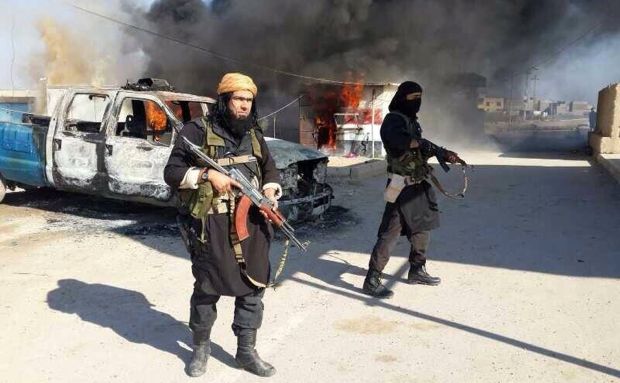
This undated file image posted on a militant website on January 4, 2014, shows Shakir Waheib, a senior member of the Islamic State of Iraq and Syria (L) next to a burning police vehicle in Iraq’s Anbar Province. (AP Photo)
Beirut, Asharq Al-Awsat—The Islamic State of Iraq and Syria (ISIS) is seeking to unify the areas under its control in Syria and Iraq, prompting fears of the establishment of an Islamic emirate.
ISIS is seeking to connect the Syrian territory under its control, particularly in Deir Ezzor, with Iraq’s restive Anbar province, the head of the UK-based Syrian Observatory for Human Rights, Rami Abdul-Rahman, told Asharq Al-Awsat.
“In the event that ISIS is able to defeat the Al-Nusra Front and the Islamist factions fighting alongside it in the areas east of Jadid Aghiadat in Deir Ezzor, this will be the first geographic link between Syria and Iraq,” he said.
ISIS has tightened its grip on Syrian territory between Raqqa and Deir Ezzor, after pushing back rival Islamist factions in the region, including the Al-Qaeda-affiliated Al-Nusra Front.
ISIS is currently in control of the majority of territory east of the city of Raqqa, in northern Syria, extending to Deir Ezzor, about 62 miles (100 kilometers) from the Iraqi border.
In Iraq, military forces have recently launched a major offensive to retake ISIS-held territory in Anbar province, including parts of the cities of Fallujah and Ramadi, but the militants appear to be holding out.
Many fear that the expansion of ISIS-held territory across the border could facilitate movement between Iraq and Syria and provide ISIS militants on both sides with fresh reinforcements.
Syrian National Coalition member Abdulrahman Al-Haj acknowledged the threat represented by ISIS strengthening its presence in the border region, adding that the presence of oil wells in both Deir Ezzor and Anbar could serve to provide financial assistance to the militant group.
“The tribal environment, based on hierarchical relations that allow the leader of the tribe to decide for all tribal members, could help ISIS expand its influence. If ISIS is able to gain control over a tribal leader, it would ensure the loyalty of the entire tribe,” he told Asharq Al-Awsat.
ISIS has made a number of announcements in recent months regarding tribal alliances. Most recently, ISIS confirmed that Asad Bin Nawaf Raghib Al-Bashir declared his loyalty to the group after it took control of the countryside west of Deir Ezzor. Al-Bashir himself is a Syrian opposition leader, head of the Jazirah and Euphrates Front to Liberate Syria, and son of the chief of the Baggara tribe, one of the largest and most powerful tribal confederations in Syria.
